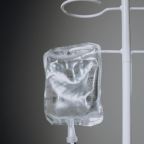
Artificial intelligence is saving lives at Derriford Hospital
The team at University Hospitals Plymouth NHS Trust (UHP) has joined a multi-centred regional assessment to use Brainomix software to help stroke patients and save lives. Every year, around 100,000 people in the UK suffer a stroke and Brainomix software uses artificial intelligence to interpret scans and identify the right treatment, faster. This gives stroke teams vital extra minutes to treat patients and ensure the best possible outcomes. UHP (working in collaboration with other trusts in Devon and Cornwall) is one of five networks in the UK within this programme of works. The system is in wide use nationally with over 50 UK centres and over 8000 cases processed per month.
Having heard about the advances in artificially intelligent software for identifying stroke patients, the committed team at UHP discovered Brainomix and investigated funding for a trial. As part of the prestigious national AI in Health & Care Award, the project will be funded for three years by NHSX.
“Brainomix is game changing,” said lead consultant Dr William Mukonoweshuro. “Its real strength, for me, is how quickly it identifies patients from all over Devon and Cornwall who will benefit from a potentially life-saving thrombectomy.” A thrombectomy is where a blood clot is removed by pushing a flexible tube along an artery. The clot is then pulled out with a special device. Not all patients who have a stroke are able to have a thrombectomy, but when it is possible the outcomes can be spectacular with many patients able to make a full recovery.
Time is critical, however, with patients standing the greatest chance of returning to normal if they are treated within three hours of the stroke. In an area such as Devon and Cornwall, where patients may need to travel many miles to get to the team at Derriford, the ability to cut the time between having a scan and being sent for treatment can make all the difference. The Brainomix software can flag patients on the system in less than a minute where previously it might have taken 20 minutes or more. It also helps to standardise care by objectively analysing the data and ensuring all patients who could benefit are identified early.
Riaz Rahman, VP Healthcare Global, Brainomix said: “From the outset of working with the clinical team at UHP, it was self-evident that our priorities were closely aligned. Our ambition is to provide a world class stroke AI platform that provides instantaneous clinical information to inform treatment. We understand and recognise that every minute matters for a stroke patient. The team at UHP can now simultaneously view images with their associated referring centres to ensure every eligible patient for treatment is identified as soon as possible.”
Last year, the dynamic team at UHP that includes specialist nurses, radiographers and anaesthetists as well as radiologists doubled the number of thrombectomy procedures to 90 and expects to double this yet again this year to around 180. Eventually, it is hoped that around 300 patients a year in Devon and Cornwall could benefit from this intervention. To this end, the team has processed over 400 scans on the Brainomix software since January 2021, including patients from Royal Cornwall Hospitals NHS Trust, Royal Devon and Exeter NHS Trust, Northern Devon Healthcare NHS Trust as well as UHP.
“Nothing beats seeing a seriously ill stroke patient conscious and talking again just a few hours after a thrombectomy. Every member of our highly capable team has a voice and wants to push the boundaries when it comes to patient care,” said Dr Mukonoweshuro. “Using the Brainomix software means more people can access the best treatment.”











